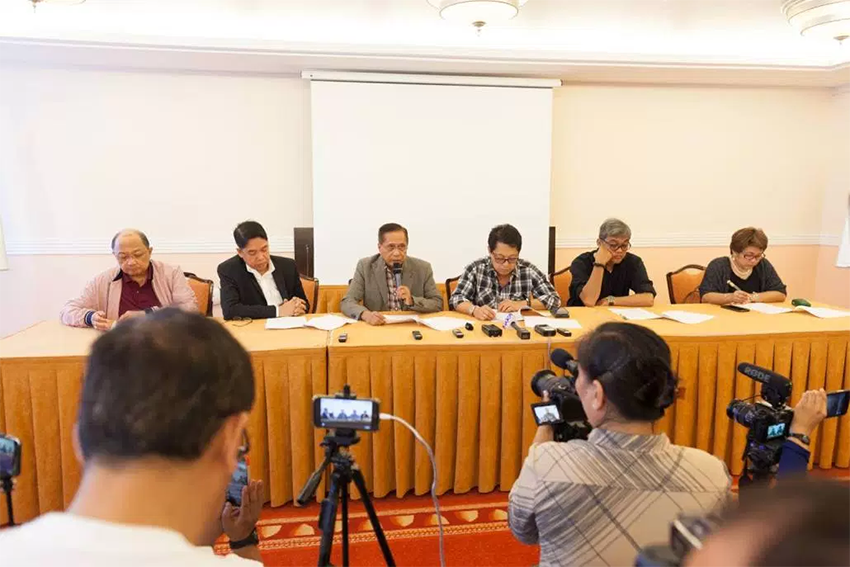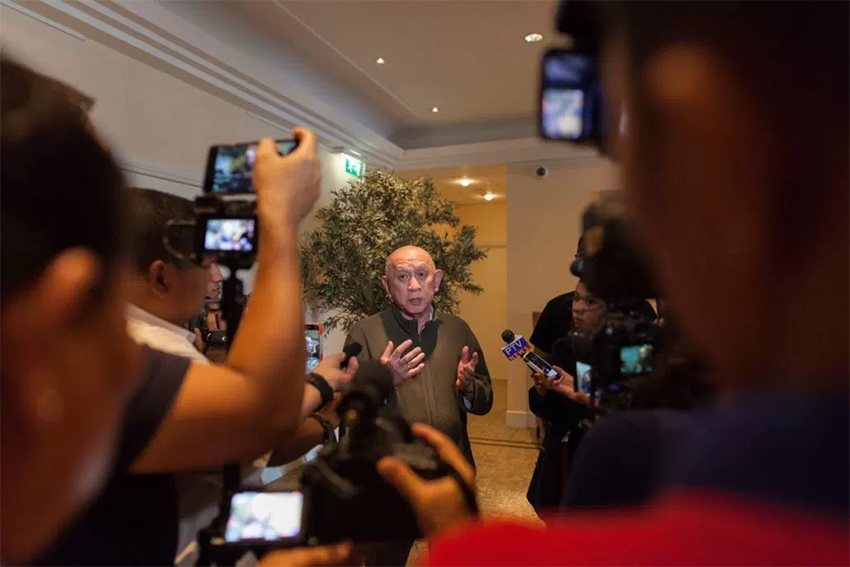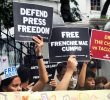
NDFP and GRP panel-to-panel meeting with the Third Party Facilitator. (Photo by Kodao Productions)
NOORDWIJK ANN ZEE, The Netherlands — The Reciprocal Working Committee on Social and Economic Reforms of the National Democratic Front of the Philippines said it is vital to ink a deal to have a conducive environment to proceed with the peace negotiations.
Randall Echanis, member of the NDFP RWC-SER said they come prepared for the fifth round and is geared toward finishing the discussions on agrarian reform and rural development and starting the discussions on national industrialization and economic development. The two are the important sections of the Comprehensive Agreement on Social and Economic Reforms.
During the last rounds of talks held here from April 3 to 6, the RWCs-SER of both Parties identified contentious provisions of the drafts of the NDFP and GRP under ARRD and agreed to convene the bilateral teams to accelerate the negotiations on SER.
However, the GRP announced that it will not participate in the fifth round of talks as they await a reply from the Communist Party of the Philippines to reconsider its previous order to intensify its offensives after President Rodrigo Duterte placed Mindanao under Martial Law.
The government panel questioned the sincerity of the communists in the talks as it demanded the CPP to rescind its order.
Presidential Peace Adviser Jesus Dureza said the directive of the CPP is a “defiant, blatant and serious challenge” directed at the government.
“Despite all these gains in our work for peace and despite the personal show of goodwill and trust that the President no less has extended to the leaders of the CPP, the government panel is now left without any other recourse but to announce…that it will not proceed to participate in the scheduled fifth round of peace negotiations until such time as there are clear indications that an enabling environment conducive to achieving just and sustainable peace in the land through peace negotiations across the table shall prevail,” Dureza said.

Government of the Philippines peace panel members press conference on the fifth round of talks with the National Democratic Front of the Philippines in Noordwijk Aan Zee, the Netherlands. (Photo by Kodao Productions)
But the NDFP described the GRP’s demand as “unreasonable.”
NDFP Peace Panel Chair Fidel Agcaoili said the CPP’s order was in response to the intensified military operations and human rights violations following the declaration of Martial Law.
Agcaoili quoted reports of indiscriminate firing and shellings by the military in Barangay Colon Sabak, Matanao, Davao del Sur on May 24. He added that the military “dropped bombs, shelled and indiscriminately fired 50 caliber machine guns” in Moro communities in villages in President Roxas, North Cotabato and in Damulog, Bukidnon provinces.
Agcaoili also said agreeing to a ceasefire without reforms is “unreasonable.”

NDFP panel chairperson Fidel Agcaoili (Photo by Kodao Productions)
The scheduled opening of the fifth round on Saturday did not push through as the Parties continue to resolve the issue.
At around 6pm Saturday (12 am Sunday PHT), the Parties met in a closed-door panel to panel discussion with the Royal Norwegian government. The meeting took a break and the Parties decided to resume the session on Sunday morning.
Echanis said the delay will affect the “momentum of the discussions on CASER.”
He said they will continue with their scheduled work and is ready to resume discussing the reforms “as soon as the GRP is committed and ready.”
Meanwhile, peace advocates in the Philippines said the “hardening of positions from both sides” may distract the panels from achieving agreement on social and economic reforms which they believe are the foundation of a just and lasting peace.
“We urge both panels to hold the fort. Let us not allow Martial Law to divide our common quest for a principled peace based on social justice,” said Bishop Felixberto Calang, main convenor of the Sowing the Seeds of Peace.
Calang said they believe Martial Law will affect the peace process.
“We reiterate our belief that Martial Law contravenes our common goal of attaining long-term peace,” he said.
“Martial Law is indeed a harsh instrumentality that any state can wield towards blanket fascism and suppression of people’s rights no matter how well intentioned its justification is at the onset,” Calang added.
The group said they hope the Parties will be able to find the middle ground to push for reforms.
In its statement on May 24, a day after Duterte declared Martial Law in Mindanao, the CPP said: “With martial law, Duterte has further emboldened the AFP to intensify its campaign of extrajudicial killings, abductions, torture, indiscriminate firing, military occupation of communities, forcible evacuation and hamletting of communities, aerial bombings and a myriad forms of military abuses.”
“In the past few months, his army has committed countless abuses against the people, placing entire communities under military rule in waging its counter-revolutionary Oplan Kapayapaan,” it said.
The CPP said the necessity of waging armed struggle becomes clearer with the declaration of martial law. It said the NPA must accelerate its recruitment and carry more tactical offensives.(davaotoday.com)










